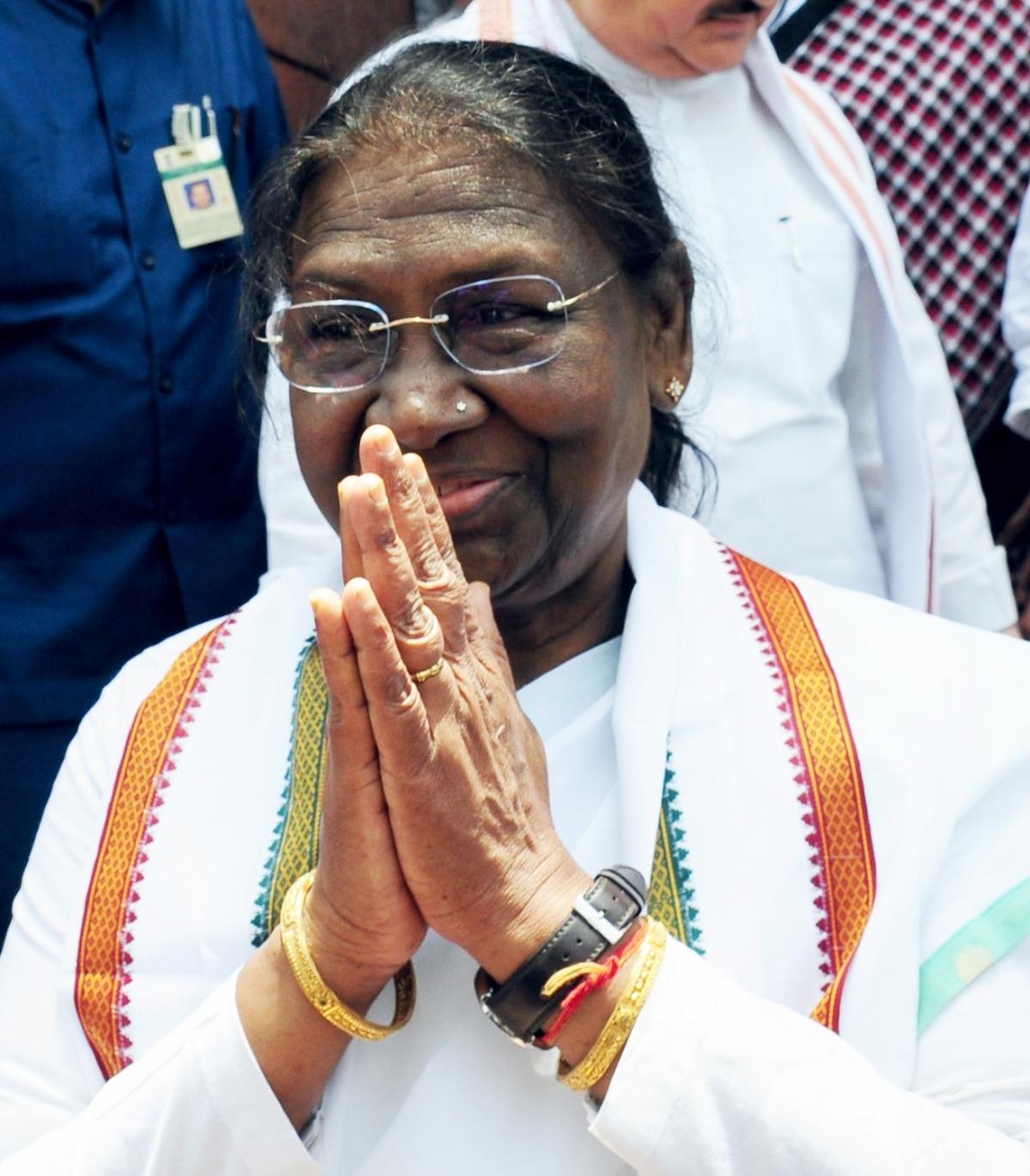


In a prestigious ceremony held at Rashtrapati Bhavan, President Droupadi Murmu honoured four great personalities of India - Jan Nayak Karpoori Thakur, P. V. Narasimha Rao, Chaudhary Charan Singh and M. S. Swaminathan - with India's highest civilian honour. These posthumous awards were received by the family members of the esteemed icons, including former Chief Minister of Bihar Karpoori Thakur's son and former Prime Minister Narasimha Rao's son. The event was attended by several Union Ministers and political leaders, marking the significant contribution of these leaders in the political landscape of India.
Honouring India's Stalwarts: Chaudhary Charan Singh's Legacy and Recent Recognition
Background
Chaudhary Charan Singh, a prominent Indian politician, played a pivotal role in the country's political panorama. Born in 1902 in Uttar Pradesh, he joined the Indian National Congress but later emerged as a formidable leader of the farmers' movement.
Singh's political career spanned decades. He served as the Chief Minister of Uttar Pradesh from 1967 to 1970 and 1977 to 1979. He also held several ministerial positions in the central government and was elected to the Lok Sabha multiple times.
Singh's main focus was on rural development and farmers' rights. He believed in the empowerment of the agricultural sector and introduced several policies to ensure the welfare of farmers. His contributions include:
Recent Recognition
In a prestigious ceremony held at Rashtrapati Bhavan, President Droupadi Murmu recently honoured Chaudhary Charan Singh with the Bharat Ratna, India's highest civilian honour. The award was received by his family members. This recognition highlights the immense impact he had on India's political and agricultural landscape.
Top 5 FAQs and Answers
Q1: Why was Chaudhary Charan Singh awarded the Bharat Ratna? A1: For his significant contributions to Indian politics, particularly his advocacy for farmers' rights and rural development.
Q2: What were some of his key policies? A2: Promotion of cooperative societies, establishment of the National Farmers Commission, and abolition of zamindari.
Q3: What political parties did Singh belong to? A3: Indian National Congress, Bharatiya Kranti Dal, and Janata Party.
Q4: What significant events occurred during his tenure as Chief Minister? A4: Green Revolution in Uttar Pradesh, land reforms, and peasant mobilization.
Q5: How did Singh's legacy impact India? A5: He helped improve the lives of farmers, strengthened cooperative movements, and contributed to India's political consciousness.
Conclusion
Chaudhary Charan Singh's recognition with the Bharat Ratna is a testament to his unwavering commitment to India's progress. His legacy as a champion of farmers and rural development continues to inspire generations and shape India's path towards a more inclusive and prosperous society.

Union Home Minister Amit Shah spoke at the inauguration of the 60th DGsP/IGsP conference in Raipur where he stated that Naxalism in India will be fully eliminated before the next conference. He also highlighted the government's efforts in strengthening the security grid and providing permanent solutions to long-standing national security challenges. Shah emphasized the importance of intelligence and collaboration with agencies to tackle drug trafficking and organized crime. He also mentioned the strengthening of India's policing framework, making it amongst the most modern globally.

In a recent Q&A session, Professor Michael Clarke addressed the impact of a leaked call between Donald Trump's envoy and Russia on peace talks. He also discussed Putin's desire for a great legacy, which has led to a lack of pragmatism. According to Clarke, approximately 4,000 main battle tanks and 30,000 pieces of armoured equipment have been destroyed in the conflict, with Russia focusing on building more complex modern tanks. Don't miss out on these insightful answers from the expert.

Following his party's disappointing performance in the recent Bihar Assembly election, politician Prashant Kishor has raised concerns about the voting results, stating that they did not align with the public sentiment he witnessed during his campaign. Despite this setback, Kishor remains determined to build a stronger political organization and continue engaging with the public in preparation for future elections. He also addressed criticisms of his role as an election strategist, reminding critics that one loss does not define his political future.

Indian government under the leadership of Prime Minister Narendra Modi has introduced four new labour codes aimed at protecting the rights and well-being of 40 crore workers across the country. Union Minister Mansukh Mandaviya has hailed the move as transformative and a major step towards ensuring the welfare of the workforce. The new codes bring in much-needed changes such as formalisation and transparency through appointment letters, and universal social security coverage for all workers including gig and platform workers.

In Uttar Pradesh's Lakhimpur Kheri, a police constable is in hot water for allegedly forging a court order to clear his name in an old case, with the intention of securing a promotion. The fabricated document surfaced during an internal investigation, prompting authorities to file a fresh case against the constable. This incident adds to the growing issue of corruption and misuse of power within the police force.

The Supreme Court has directed the formation of a Special Investigation Team (SIT) to conduct a fact-finding inquiry against Vantara, an animal rescue and rehabilitation center in Gujarat, following allegations of non-compliance with laws and acquisition of animals. The SIT, headed by former apex court judge J Chelameswar, will also look into reports of irregularities and complaints from NGOs and wildlife organizations. Vantara has assured full cooperation to the probe and reaffirmed their commitment to animal welfare.

The ongoing family feud within the Rashtriya Janata Dal (RJD) continues to escalate as three more daughters of party patriarch Lalu Prasad Yadav have left the family residence in Bihar's capital Patna. This comes just a day after another daughter, Rohini Acharya, publicly denounced the family and quit politics following the party's poor performance in the recent elections. Amidst allegations of insults and mistreatment, the saga continues to unfold within the Yadav family.

In a special lecture series in Bengaluru, RSS chief Mohan Bhagwat emphasized on the Hindu identity as a responsible and proud son of Bharat Mata. He urged the Hindu society to come together and share the message of 'Vasudhaiva Kutumbakam' with the rest of the world. Bhagwat also recalled the RSS founder and its journey of facing opposition and growth through dedication and sacrifice of its volunteers.

As the West Bengal Assembly elections near, the political battle between Bharatiya Janata Party (BJP) and Trinamool Congress (TMC) has intensified on social media. Following the BJP's victory in Bihar, the party declared its hopes to defeat TMC in Bengal on a popular platform, while TMC leader Kunal Ghosh responded with a proverb highlighting the BJP's potential failure in Bengal. Despite BJP's confidence, TMC remains unfazed and asserts their strong hold in the state.

Congress leader and Leader of Opposition in Lok Sabha, Rahul Gandhi, was criticized by BJP's Shehzad Poonawalla for going on a jungle safari in Madhya Pradesh's Satpura Tiger Reserve instead of focusing on the ongoing Bihar elections. Gandhi had earlier claimed that "vote theft" had taken place in several states, including Madhya Pradesh. BJP's Poonawalla mocked Gandhi's "priorities" and referred to him as the "Leader of Paryatan and partying."